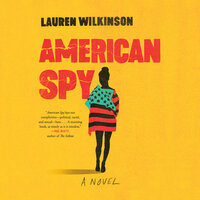Take a photo of a barcode or cover
I wanted to like this book but I just couldn't get there. I'm not quite sure what it was missing, but it felt like it almost had all the pieces but couldn't quite get there. There were definitely interesting parts. I was sucked in from the first page, and the premise was intriguing. But I'm not sure why it didn't work. Too much detail in some parts and not enough others? I don't know. Maybe a better editor could have made this the hit it should have been.
I liked Marie and enjoyed being in her head. I would say that this is less an "espionage novel" rather than a novel about a woman who is a spy, and I think it's more interesting for that.
Is this a spy thriller? Historical novel? Anti-imperialism manifesto? Romance? Critique of the treatment of Black Americans, Black women in particular? This just tries to be too much. First personal narration in the form of a journal-to-my-sons doesn’t work. I had high hopes in the beginning but then it just wandered off. The relationships between Marie and Helene, Marie and Agatha, Marie and Thomas, Marie and her bosses are superficially explored, leaving the reader to guess at motivation. For such a smart person (as her family, friends, and colleagues repeatedly point out), Marie acts like a dummy. While reading I kept asking myself, would a mother REALLY be writing some of this stuff to her children? Some of the analogies were absurd. Given the high ratings I expected more and am just disappointed in this one
It was an OK book. Nothing against it but nothing outstanding about it either.
What I liked most about this book is, that the spy story is almost just a reason to ponder about serious moral issues of the American 'export' of democracy, and whether it is justified in any circumstances; whether certain immoral acts could be considered 'patriotic' if the outcome benefits the US (whether the means justify the end - old, classic dilemma, to which I always answer, 'no, they don't justify under any circumstance'). It was also very thought provoking how the book treated the bad/good aspects of 'communism' (why the heck Americans call 'communist/communism' every fricking socially responsible act?!) I did like that it had a very unusual setting in this genre: a black spy woman (raising kids by herself!), and in a country we don't hear too much about: Burkina Faso.
That said, the novel lacked some real passion and the ability to disturb the reader (in a good sense). Although the events were extremely dramatic and tragic, with a strong chance to be also quite emotional and disturbing, Wilkinson managed to tone down the narration to the point when sometimes it almost fell into boredom (not quite, but almost). The style she chose to write this novel is too dry, too indifferent considering the topic and the story. I felt pretty frustrated reading this novel because of that.
Also I am not sure what her goal was with some untied story lines (Marie's sister's death, and Ross's fate). Did she set up the scene for a sequel? (Hope not.) Did she leave them untied thinking they mimic 'real life' in this way (where there are rarely neatly tied endings)? I am not sure; I don't mind unfinished/floating story endings at all, but unfortunately this time it was done in a clumsy way and it caused more frustration than a cathartic ending.
What I liked most about this book is, that the spy story is almost just a reason to ponder about serious moral issues of the American 'export' of democracy, and whether it is justified in any circumstances; whether certain immoral acts could be considered 'patriotic' if the outcome benefits the US (whether the means justify the end - old, classic dilemma, to which I always answer, 'no, they don't justify under any circumstance'). It was also very thought provoking how the book treated the bad/good aspects of 'communism' (why the heck Americans call 'communist/communism' every fricking socially responsible act?!) I did like that it had a very unusual setting in this genre: a black spy woman (raising kids by herself!), and in a country we don't hear too much about: Burkina Faso.
That said, the novel lacked some real passion and the ability to disturb the reader (in a good sense). Although the events were extremely dramatic and tragic, with a strong chance to be also quite emotional and disturbing, Wilkinson managed to tone down the narration to the point when sometimes it almost fell into boredom (not quite, but almost). The style she chose to write this novel is too dry, too indifferent considering the topic and the story. I felt pretty frustrated reading this novel because of that.
Also I am not sure what her goal was with some untied story lines (Marie's sister's death, and Ross's fate). Did she set up the scene for a sequel? (Hope not.) Did she leave them untied thinking they mimic 'real life' in this way (where there are rarely neatly tied endings)? I am not sure; I don't mind unfinished/floating story endings at all, but unfortunately this time it was done in a clumsy way and it caused more frustration than a cathartic ending.
Again a book with a lot of hype. Super interested storyline and characters though I kinda wanted more of the ending-perhaps a sequel. I am also not a fan of the way the storytelling was done via talking to her kids. But the insight into intelligence during the Cold War through the perspective of a woman of color was fascinating.
A book club book which I really enjoyed reading. Interesting perspective on US interference in the domestic affairs of other countries. Worth a read!
“I hope that if you’re called to resist injustice you’ll have the courage to do so. I hope you’ll love fiercely and freely. In those ways I hope you’ll be good Americans.”
“I note this to point out precisely how lost I was when it came to commercial interactions in Ouagadougou. My ability to buy things, or in some cases even recognize a building as a place of commerce, was a surprisingly accurate indicator of the overwhelming Americanness that made it difficult for me to navigate this new place.”
The protagonist of this book was written in a very complex way, unsure of her own motivations and often contradicting herself, which challenged me as a reader. It made me reflect on how characters in books are often portrayed as being a lot more self aware and self assured than real people and how unrealistic that is-but how much simpler it can make connecting with them.
I also appreciated the author giving so much context to the time period (growing up in the Cold War) and how that impacted the motivations of many of the characters in ways that I really wouldn’t have understood otherwise.
Finally, the descriptions of West Africa gave me a lot of joy and brought up lots of memories for me of my time in Benin. The quote above describes a really specific challenge I had-not realizing all the places I could buy food or items in my village (i.e. the woman cooking beans over a fire next to the rode across the street or the shack that sold plastic water bags from a fridge out back) until weeks or months in because they looked nothing like American places of business.
“I note this to point out precisely how lost I was when it came to commercial interactions in Ouagadougou. My ability to buy things, or in some cases even recognize a building as a place of commerce, was a surprisingly accurate indicator of the overwhelming Americanness that made it difficult for me to navigate this new place.”
The protagonist of this book was written in a very complex way, unsure of her own motivations and often contradicting herself, which challenged me as a reader. It made me reflect on how characters in books are often portrayed as being a lot more self aware and self assured than real people and how unrealistic that is-but how much simpler it can make connecting with them.
I also appreciated the author giving so much context to the time period (growing up in the Cold War) and how that impacted the motivations of many of the characters in ways that I really wouldn’t have understood otherwise.
Finally, the descriptions of West Africa gave me a lot of joy and brought up lots of memories for me of my time in Benin. The quote above describes a really specific challenge I had-not realizing all the places I could buy food or items in my village (i.e. the woman cooking beans over a fire next to the rode across the street or the shack that sold plastic water bags from a fridge out back) until weeks or months in because they looked nothing like American places of business.
Loved this book - got off to a slow start - last 80 pages!!! Hard to believe it is her first novel.
To each his own - I wanted this to be so much better. I must have said just stop about 10 times and never did and truly wish I had the first time.
Why is the main character described as brilliant, where are the examples/evidence? How did she fall in love so deeply after 3 meetings? So many missed opportunities with the story. Such an interesting plot and historical background lost to boredom.





